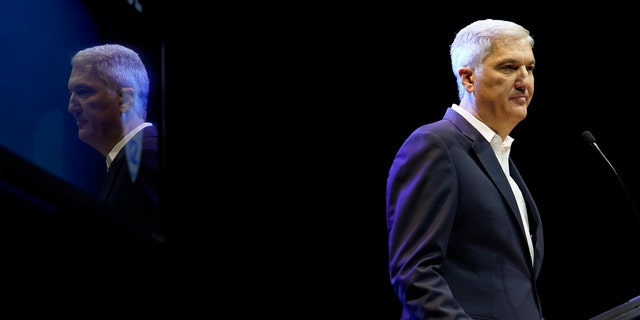Pac-12 commissioner touts conference expansion following departure of USC, UCLA
Pac-12 Commissioner George Kliavkoff said his conference is far from finished, despite the defections of Southern California and UCLA.
Kliavkoff confirmed the Pac-12 is actively exploring expansion and lobbed several feisty jabs at the Big 12 during an eventful opening speech at his conference’s football media day Friday — likely its last in the nation’s second-largest media market.
While painting a promising picture of the league’s future even after USC and UCLA leave for the Big Ten in 2024, Kliavkoff said the Pac-12 intends to keep its current members while entertaining new additions.
USC, UCLA TO LEAVE PAC-12 FOR BIG TEN IN 2024: REPORTS
The commissioner also acknowledged frustration with the upheaval created by the defections, saying he had spent the past month “trying to defend against grenades being lobbed in from every corner of the Big 12 trying to destabilize our remaining conference.”
Kliavkoff responded to Big 12 Commissioner Brett Yormark’s recent declaration that his league was “open for business” in expansion by suggesting those moves could include Big 12 schools coming his way, instead of the opposite assumption.
“With respect to the Big 12 being open for business, I appreciate that,” Kliavkoff said. “We haven’t decided whether we’re going shopping there or not.”

“I understand why they’re doing it, when you look at the relative media value between the two conferences,” Kliavkoff added later. “I get it. I get why they’re scared, why they’re trying to destabilize it. I was just tired of that. That’s probably not the most collegial thing I’ve ever said.”
The Pac-12 has lost its Los Angeles flagships after nearly a century of history, and Kliavkoff acknowledged the widespread speculation about the long-term health of his comparatively underfunded West Coast conference. The commissioner insisted the Pac-12 will have a stronger base after its new media rights deal, and that footing could lead to expansion.
Kliavkoff understandably didn’t identify specific schools as candidates for expansion, although San Diego State has been repeatedly mentioned by others. He reiterated the league’s determination to keeping a football presence in the talent-rich, heavily populated end of California.
SEC, PAC-12 LEADERS TO PUSH FOR NIL LAW IN DC
“Southern California is really important to us,” Kliavkoff said. “I think there are different ways of approaching staying part of Southern California. We may end up playing a lot of football games in LA.”
Kliavkoff speculated that the remaining Pac-12 schools are likely to get a significant boost in recruiting fertile Southern California in every sport except football, given that many Olympic sport athletes aren’t going to want to fly off to the Midwest and East Coast regularly for competition.
He reiterated that the Pac-12 expects to keep its remaining members despite widespread speculation about both the Big 12 and the Big Ten looking to expand. Oregon and Washington were linked to a future move to the Big Ten immediately after USC and UCLA announced their departures, while the Big 12 has been linked to many of the Pac-12 schools.
Kliavkoff is confident after holding “two board meetings a week for the last four weeks” with his members.
“Looking my colleagues in the eye, understanding their commitment, that their first priority is making sure that the Pac-12 survives, thrives and grows and is successful,” Kliavkoff said. “They’re committed to the conference.”
PAC-12 DECIDES IT WILL NOT EXPLORE EXPANSION
He also held open the door to a highly improbable return for UCLA: The public school has been ripped by California Gov. Gavin Newsom for the move, and the UC Board of Regents has ordered a review of the decision in a hearing scheduled for Oct. 17.
“I’d say UCLA is in a really difficult position,” Kliavkoff said. “There are a lot of constituents related to UCLA who are very, very, very unhappy with the decision. Student-athletes, the families of student-athletes. The faculty, the staff. The politicians, the fans, the alumni. … I can’t give you a percentage chance. I think it’s unlikely. But if they came back, we’d welcome them back.”
Read the full article Here


